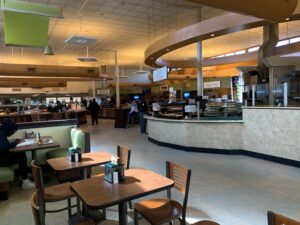
Many students on Florida A&M University’s campus are dissatisfied with the menu options on campus. Students find that the food provided is not diverse or representative of different diets. They want to see a change in the food that is served on campus.
There is diversity here at FAMU, and students feel that the menu should be a reflection of that. This includes students who adhere to vegan, vegetarian, and pescatarian diets.
“The menu options here on campus are very dull and what we eat is repetitive. I feel like they try to represent different cultures, but it’s hard,” freshman student, Kenijah Brown, expressed.
This is a popular opinion among much of the freshman class, who elected Marcus Thomas as their first-seat freshman senator.
One of Thomas’ major platform points was to work on, “Healthy menu options that includes distinct cultural foods to accurately represent our diverse student body.”
Since his election, he has stuck to this goal and said, “Every nationality on campus should have options in the cafe to make each and every student feel at home. I am a strong believer that when students feel at home there is no way that you can’t be successful.”
He has been working on this issue, but has found that Metz, the culinary management company for FAMU, feels that their menu options are healthy enough. He has decided to continue to focus on getting more diverse options for the student body.

Catherine Segar, the marketing manager for Metz, wrote about Metz’s efforts to provide diverse options and satisfy students in an email.
“The menu options are chosen based on feedback received from the annual dining survey, culinary ambassador meetings, and comments sent to us via comment cards. It is very important to Metz that the menu options are diverse in many ways, including dietary restrictions and culturally,” said Segar.
“We have themed cultural lunches and dinners twice a month in the main dining hall. Most recently we served Bahamian, Italian and Mexican inspired meals.”
In regards to representing different diets, Segar expressed, “For students who have dietary restrictions, we will make special meals upon request. We just need the students to let us know what their needs are.”
Metz’s seems to try to provide a satisfying diet for every student on FAMU’s campus, yet students are still dissatisfied with their options.
The heart of the issue seems to be communication. Metz has stated that they will make an effort to accommodate everyone, but they need to be notified.
Thomas has done a good job of sticking to his goal, but it is clear that the job cannot be done alone. Students have to do more than complain about menu options in conversation. They will have to take advantage of the ambassador meetings, dining surveys and comment cards if they want to see results.
Students also have the ability to contact Metz through their website or by visiting their locations and speaking to a manager. Once the opinions of students are heard by Metz, then maybe they will see a change.